Sonic Highwayman Dave Grohl
Foo Fighters frontman documents ATX culture and tradition
By Kevin Curtin, 10:00AM, Thu. Nov. 20, 2014
Foo Fighters tape their second Austin City Limits appearance tonight at ACL Live at the Moody Theater on the heels of a journey down Austin’s Sonic Highways. Dave Grohl called the Chronicle earlier this month to discuss the local segment of his HBO series and fielded questions about Nirvana’s Texas shows in 1991.

Austin Chronicle: So you just stepped right in and made one of the best music documentaries about Austin?
Dave Grohl: We were a little nervous making this episode because we’re trying to make a point that cities like Austin have to stick up for themselves and protect themselves from losing the thing that’s special – the heart of the city. We were interviewing people and talking about this and I started to get a little worried that the direction had shifted from the history of music there to the future of music there. Then I realized that’s what we should embrace.
Talking to Terry Lickona, talking to Gary Clark Jr., talking to Jimmie Dale Gilmore – they’ve seen the city change. I think the most important thing to them is that the roots and history of the music is represented.
The first person that saw it was Terry. He wrote me and said, “That’s the first time anyone has told the story of Austin and Austin City Limits so well. Thank you.” Man, it was such a weight off my shoulders. When I make these episodes, my most important critics are the people in them. That they feel like I’ve done them justice.
AC: You have a lot of great interviews in Sonic Highways, including Roky Erickson, Gibby Haynes, and David Yow. Who didn’t make the cut or weren’t available to comment?
DG: For the entire series, we tried to interview about 100 people and I think only three people declined, so we got almost everyone we wanted to get. The logistics of putting something like this together are crazy. We’ve been working on this for almost two years and we kept it a secret for a year-and-a-half.
We did a good job on that, but it was such a massive undertaking. I’ve never done anything like this in my life! It’s just been 24 hours a day for a year-and-a-half, and, good God man, it’s been the most exciting year of my life because these interviews were more like lessons.
I got to sit down and talk about Texas music with Willie Nelson. I got to sit down and talk about country and Nashville with Dolly Parton. I got to sit down with Chuck D and talk about New York City and rap. It’s fucking insane! I went on a mission and learned so much about American music.
AC: With Sonic Highways and before that Sound City, you’re becoming a storyteller of American music. What’s next for you in that regard?
DG: First of all, I really like my day job. I got a good fuckin’ gig! But I think it’s important that someone with the opportunity and resources documents the histories of these people, along with the music, for the next generation. Culture and tradition have been handed down for thousands of years though stories and now, with the accessibility of documentaries, you can quickly inspire people worldwide.
When it comes to music, there’s nothing more inspiring than seeing another musician share their passion. Hearing about Buddy Guy building his first guitar out of wires and nails from his screen porch, and then becoming a blues legend – that kind of information changes people’s lives because it’s human and the opportunity is entirely real. I try to inspire them to be inspired and that’s the challenge.
How do you show people that everybody can follow their crazy-ass dreams? Just watch any of the Sonic Highways interviews. Every single one of those people started with nothing and ended up with an incredible story.
AC: Have you gotten any feedback from directors? Did Ken Burns call you up and say, “Good job, Dave”?
DG: No man, I’m scared of that. It would like having your favorite drummer come up and say, “Hey, you’re pretty good!” I’m my own worst critic, but once it leaves my grips I’m free of it. I do what I do as well as I can do it and, for me, that’s good enough. I don’t kill myself over the details. I’m really flattered when people come up and say they’re inspired, but if it’s not your thing, it’s not your thing.
AC: You’re known for so many different things. For all of your successful creative projects, what have you attempted that never got off the ground?
DG: If I start something, it goes because I’m not going to half-ass it. Oh! I started a shoe company once! Nobody knows that. It’s funny.
AC: What happened with it?
DG: It fuckin’ ate shit. What do I know about shoes? I had been looking for an old pair of Air Jordan high tops like the metalheads used to have and nobody was selling them, so me and my buddy Nick started a shoe company called Hooves. We made death metal-inspired high tops with a pentagrams and the logo looked like Celtic Frost’s. We signed a deal with Burton and they made like 1,000 of them. Most went to Japan and then it just went under.
AC: While making Austin’s Sonic Highways, did you think back to Nirvana’s 1991 Liberty Lunch gig?
DG: I remember Liberty Lunch because I played there with Scream. But yeah, that was a crazy Nirvana tour, because no one expected Nevermind to do what it did and the little venues couldn’t keep up. We’d have a show booked at a place that holds 600 people and there’d be 600 more outside.
The tour turned into chaos. Remember what happened at Trees in Dallas? Kurt [Cobain] smashed the monitor board and a security guy’s head with a guitar and there was blood everywhere. Every show got crazier and when we got home we were like, “Goddamn, what was that?” The album was going platinum and we were still in the same van.
AC: What’s the music mecca that didn’t make the Sonic Highways series?
DG: So many cities in America have incredible musical histories – Memphis, Detroit, San Francisco, and Boston – that it would take a whole other series to go over. Instead of telling the story of Memphis, which a lot of people know, I wanted to do Washington D.C., which a lot people don’t know about musically. We had to make decisions.
A lot of people know Austin is important to the industry culture because of South by Southwest, but maybe they don’t know the roots of it so I wanted to tell that story. In the Los Angeles episode, we don’t stay in Hollywood. We go way out in the desert to Joshua Tree at Rancho De La Luna. I wanted get off the beaten path a little bit.
We could have gone to Detroit and made a five-hour episode about all the legends that came out of there, but I think people already know about the Hit Factory and Motown. Let’s move on to things they might not know about. I get to tell the world about Kyuss and Minor Threat on HBO.
AC: You have a tailored song for each city at the end of every episode. What was the process for making those?
DG: Here’s how it works. About a year-and-a-half ago, I rounded up all the instrumental ideas I’d been working on and showed them to the band. There were about 40 and we picked eight that sounded like they would make a great Foo Fighters record and assigned each one to a city. We rehearsed them so when we got into the studios, we would have our shit down and blast them out in a couple takes.
Pairing songs with cities instrumentally was funny because I didn’t write the lyrics until the last day of each session. So the first day we’d load in gear. The next day we’d put mics up and start recording, and then I’d go interview some people. The next day we’d do a couple overdubs. The next day we’d put some keyboards on then go interview people.
By the fifth day, I’d have interviewed a bunch of people and the track would be ready to sing on. I’d then take the transcripts from the interview back to my hotel room, drink a bottle of wine, and pick and choose different words, sentences, and phrases from the transcripts and make them into the lyrics of the song. Then the next day, I’d sing it. All of the songs, I’d written about 12 hours before I actually sang them.
And it worked. It was fucking cool! The next day we’d shoot a performance video for the finale of the episode and the lyrics come up on the screen, and you recognize all the references from the stories you just heard.
A note to readers: Bold and uncensored, The Austin Chronicle has been Austin’s independent news source for over 40 years, expressing the community’s political and environmental concerns and supporting its active cultural scene. Now more than ever, we need your support to continue supplying Austin with independent, free press. If real news is important to you, please consider making a donation of $5, $10 or whatever you can afford, to help keep our journalism on stands.
Kevin Curtin, Nov. 7, 2014
Kimberley Jones, March 13, 2013
May 30, 2025
May 16, 2025
Dave Grohl, Foo Fighters, Nirvana, Sonic Highways, Austin City Limits, Terry Lickona, Hooves, Willie Nelson, Dolly Parton, Buddy Guy, Kyuss, Minor Threat, Liberty Lunch, Trees









